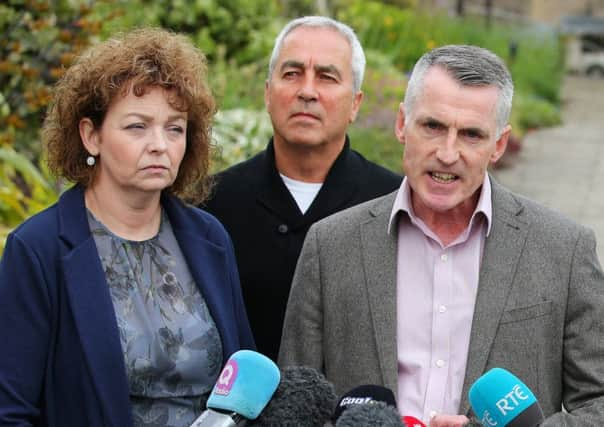Sinn Fein: DUP are not budging in talks


Delivering a bleak assessment of the negotiations to restore devolution in Northern Ireland, party chairman Declan Kearney hinted Sinn Fein could drop its opposition to DUP leader Arlene Foster returning as Stormont first minister if the DUP gave ground on other disputes.
Mr Kearney claimed the DUP was not prepared to move on republican demands for a stand-alone Irish Language Act, the introduction of same sex marriage in Northern Ireland and the introduction of a specific bill of rights for the region.
Advertisement
Hide AdAdvertisement
Hide AdHis comments came after Northern Ireland Secretary James Brokenshire warned that time was running short to strike a deal.
The parties have until 4pm on Thursday to restore a devolved executive or Northern Ireland faces the prospect of a return of direct rule from London.
Mr Kearney said: “The DUP have not moved on any of the substantive issue which sit at the heart of this crisis.
“They haven’t moved on any of the fundamental rights and equality issues that require to be embraced.”
Advertisement
Hide AdAdvertisement
Hide AdAsked if Sinn Fein was prepared to drop its opposition to Mrs Foster returning as first minister while a public inquiry into a botched green energy scheme is ongoing, Mr Kearney again stressed the urgent need was to address the “rights and equality” issues.
But he added: “In those circumstances if in fact we can find resolution and progress on all of the fundamental issues then we can address the issue of the future role of the DUP leader in a possible future executive but at this point that question is academic.”
Mr Brokenshire claimed intensive engagement was continuing inside Stormont Castle, with the parties focusing on differences over equality and language issues.
“Time is marching on,” he said.
“It is about now reaching that conclusion, meeting that statutory deadline of Thursday afternoon and finding a way through in the best interests of Northern Ireland.”
Advertisement
Hide AdAdvertisement
Hide AdRound-table all-party talks were held at Stormont on Tuesday.
While negotiations involve the five main Northern Ireland parties and the UK and Irish governments, their fate hinges on whether the two biggest parties, the DUP and Sinn Fein, can resolve their differences.
The peace process is littered with examples of apparently firm political deadlines being broken.
While Mr Brokenshire stressed the cut-off point was set in law, he did not definitively rule out another extension.
Advertisement
Hide AdAdvertisement
Hide Ad“It was an act of parliament that set that and therefore it is that very clear deadline that we are seeking to ensure is met,” he said.
Mrs Foster was forced from office in January when Sinn Fein’s then deputy first minister, the late Martin McGuinness, quit in protest at the DUP’s handling of the ill-fated renewable heat incentive scheme.
His move triggered a snap Assembly election in March.
A number of attempts to restore powersharing in the wake of that poll floundered, with three UK Government deadlines for a deal having already been missed.
Civil servants have been running Stormont departments since March.
Advertisement
Hide AdAdvertisement
Hide AdA form of direct rule from London is likely to be reimposed in lieu of a deal.
It remains unclear what impact the DUP’s Westminster parliamentary deal with the Conservative Party will have on efforts to restore powersharing.
While rival Stormont parties have largely welcomed the additional £1 billion investment flowing from the confidence and supply agreement, concerns have been raised as to whether the UK Government has fatally compromised its stated commitment to impartiality in its dealings with Northern Ireland parties.